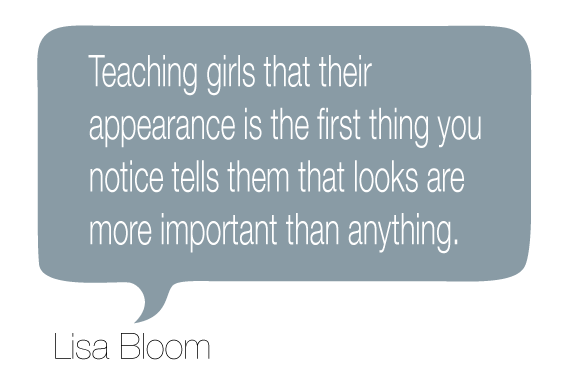
We live in a world full of gender stereotypes. Even before our children are born, the way they are meant to fit into and experience the world is dictated for them. Little girls are ‘pretty princesses’ and little boys are ‘big and strong.’ Girls get inundated with pink, while boys get blue. Girls get dolls, and boys get trucks. It goes on and on. This article by Lisa Bloom touches on one half of an issue that has been weighing heavily on my mind.
I’m extremely sensitive to gender stereotypes, primarily in how they affect the station of women in society. I wholeheartedly agree with the point that Bloom is making. We need to engage the minds’ of our girls and stop putting so much focus on the superficial. However, I also believe that it’s important for little girls to hear that they are beautiful, especially since we live in a society that is constantly telling them that they will never be pretty enough. So how do we strike this balance? How do we instill in our daughters the truth of their beauty without making it the focal point of their lives? Women are often lead to believe that they can be either beautiful or smart, but almost never both. How can we break down these notions?
I mentioned earlier that this article only touches on one half of the issue at hand, and I said that because it fails to touch on how we talk to little boys. This to me is crucial. Not only will the battle for true equality never be won unless men are advocating for it just as fiercely as women are, but we are also sending our boys many messages about their own roles and the roles of their sisters in this world. When we tell a little boy that he runs like a girl, we are really telling him that girls are ‘less than’. When we tell our sons that big boys don’t cry, we’re really telling him that emotions are not a part of being a man. The messages we send to boys are just as dangerous and insidious as the ones we are sending to girls, maybe even more so, since this is still a male dominated society.
The answer lies, in part, in actively engaging our children in discourse about the world around them and the messages that society is sending them. We can’t shield them from the world or prevent them from being bombarded by these messages or even stop them from absorbing our own flaws. What we can do is teach them to process all the information around them and to think about what they are taking in rather than mindlessly letting these things penetrate their consciousness. I can ask my son what he thinks about when the phrase, ‘you blank like a girl’, is used, and we can discuss its intricacies and the effect they have on the people that hear them. If I’m ever blessed with a daughter, I can sit down with her to talk about self worth and the idea of beauty and how it isn’t really what society wants us to believe it is. I can also accept Lisa Bloom’s challenge to leave the superficial out when talking to little girls I meet, but I also leave you with a challenge of my own: Let’s try to elevate the conversation with any children we meet, not just girls. When we meet little boys, lets talk to them about something other than their Spider-man pajamas or their train collection. Instead let us engage our children in a higher level of discourse and by doing so empower the next generation to bring about lasting change to the benefit of society and the world.
So go read this.
Leave a Reply